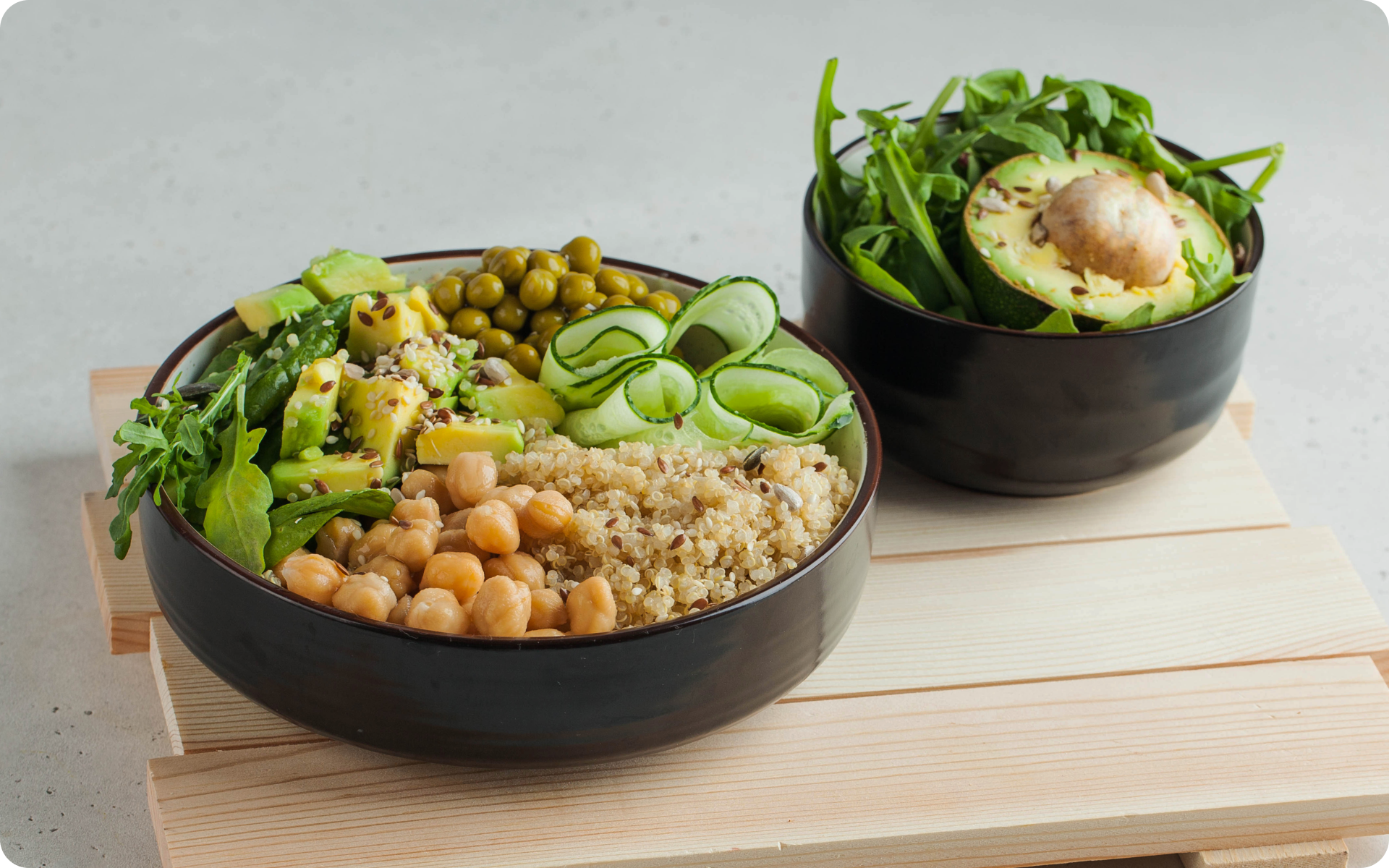Chicken broth has long been hailed as a nutrient-dense solution for a variety of purposes, from providing a flavorful base for soups and stews to serving as a comforting remedy for colds and flu. Its rich combination of vitamins, minerals, and proteins makes it a popular choice for those seeking an easy-to-digest and nourishing addition to their meals. And this is where the chicken broth diet comes into the picture — a dietary plan that puts this savory liquid at the forefront of your daily consumption. Read on as we explore the ins and outs of the chicken broth diet. We’ll provide a comprehensive overview of this meal plan and its potential benefits, as well as discuss alternative approaches that can help you achieve your desired results.
Get your personalized
meal plan!
What Is The Chicken Broth Diet?
The Chicken Broth Diet is a dietary plan that revolves around the consumption of chicken broth as its primary source of nutrients. This diet is claimed to promote weight loss, detoxification, and overall health improvement.
Here’s a detailed breakdown of what the Chicken Broth Diet entails:
1. Primary Food Source
The main component of this diet is chicken broth, which is made by simmering chicken bones, meat, and vegetables in water for an extended period. The resulting liquid is rich in nutrients, such as vitamins, minerals, collagen, and amino acids.
2. Duration
The Chicken Broth Diet typically lasts for a short-term period, ranging from a few days to a couple of weeks. It is not intended as a long-term dietary solution.
3. Purpose
The primary goal of the Chicken Broth Diet is to promote weight loss by reducing calorie intake.
4. Meal Frequency
Proponents of the Chicken Broth Diet suggest consuming the broth several times a day, either as a standalone meal or as a base for soups and stews. Solid foods are often limited or eliminated during the diet.
Read More: 4 Diet Chicken Recipes For Weight Loss
5. Additional Foods
Some variations of the Chicken Broth Diet allow for the inclusion of specific foods, such as non-starchy vegetables, lean proteins, and healthy fats. These additions aim to provide more balanced nutrition while maintaining the focus on chicken broth.
6. Hydration
Adequate water intake is essential during the Chicken Broth Diet to prevent dehydration and support the body’s metabolic and natural detoxification processes.
7. Exercise
While the Chicken Broth Diet does not explicitly require exercise, engaging in physical activity can enhance weight loss and overall health outcomes (13).
Chicken Broth Diet Variations
There are several variations of the chicken broth diet. Each variation has its unique characteristics, but they all share the common feature of utilizing chicken broth as a central component due to its nutrient-dense properties.
Water And Chicken Broth Diet
This diet primarily consists of consuming water and chicken broth as the main sources of hydration and nutrients. Solid foods are typically eliminated or significantly limited.
This variation intends to promote weight loss, detoxification, and overall health improvement through the consumption of low-calorie, nutrient-dense liquids. There is no evidence, however, that it does any of these things.
Jello And Chicken Broth Diet
This variation includes the consumption of sugar-free jello along with chicken broth. The addition of jello provides some variety in taste and texture while still maintaining the low-calorie nature of the diet.
The primary focus remains on weight loss and detoxification through a liquid-based diet, although this again lacks evidence.
Cabbage Soup Diet With Chicken Broth
In this variation, chicken broth is combined with cabbage soup as the primary food source. Cabbage soup is made by simmering cabbage and other low-calorie vegetables in a chicken broth base.
This diet aims to promote weight loss by increasing the intake of low-calorie, fiber-rich vegetables while still benefiting from the nutrients found in chicken broth.
Chicken Broth Clear Liquid Diet
A clear liquid diet typically consists of consuming only liquids that are easily digestible and leave little residue in the digestive system, such as water, clear broths, and fruit juices without pulp. In this variation, chicken broth serves as the primary source of nutrients.
This type of diet is often prescribed by healthcare professionals for a short period before or after medical and surgical procedures or to address specific digestive issues.
If you wish to free yourself from all the extra pounds that have been weighting you down for way too long, start using the BetterMe app and overhaul your entire life!
Can You Lose Weight By Drinking Chicken Broth?
Yes, you can potentially lose weight by incorporating chicken broth into your diet, but it’s essential to understand the factors that contribute to this weight loss.
Here are a few reasons why chicken broth diet weight loss works:
1. Low In Calories
Chicken broth is relatively low in calories compared to other meal options. A cup of chicken broth typically contains around 40-60 calories, depending on the recipe and ingredients used.
By replacing higher-calorie meals with chicken broth, you can create a calorie deficit, which is necessary for weight loss (3). However, most versions of this diet are extremely low in calories and not safe or sustainable for weight loss, unless under medical supervision.
2. Protein
Chicken broth contains a small amount of protein, primarily derived from the collagen and amino acids found in chicken bones and meat.
Protein is known to increase satiety, helping you feel fuller for longer periods. Eating a high-protein diet can lead to reduced calorie intake throughout the day, further promoting weight loss (9).
3. Nutrient-Dense
The vitamins, minerals, and other beneficial nutrients in chicken broth can help support overall health and well-being (14).
4. Improved Digestion
Chicken broth is easy to digest and may help soothe the digestive system. A healthy digestive system can better process nutrients and eliminate waste and also supports immunity.
Read More: How Many Carbs A Day To Lose Weight?
Limitations And Drawbacks Of Relying Solely On Chicken Broth
However, it’s crucial to consider the following limitations and potential drawbacks of relying solely on chicken broth for weight loss:
1. Unsustainable
Drinking only chicken broth for an extended period does not provide all the essential nutrients required for optimal health. Restricted diets like this can lead to nutrient deficiencies and other health complications (6).
A more balanced approach, incorporating chicken broth as part of a nutritious, balanced, and varied diet, is likely to yield more sustainable weight loss results.
2. Temporary Weight Loss
The initial weight loss experienced while consuming only chicken broth might be due to water weight loss and reduced muscle mass, rather than actual fat loss. Once you return to your regular eating habits, you are likely to regain the lost weight.
So, while chicken broth can contribute to weight loss due to its low-calorie content, it is not a long-term solution.
Incorporating chicken broth as part of a balanced diet, combined with regular exercise and healthy lifestyle choices, is a more sustainable approach to achieving and maintaining a healthy weight.
Is Chicken Broth Diet Healthy?
Drinking chicken broth can offer several health benefits, mainly due to the nutrient-rich nature of chicken broth.
Here’s a detailed overview of its potential health benefits:
Rich In Nutrients
Chicken broth is packed with vitamins, minerals, amino acids, and collagen. These nutrients contribute to overall health by supporting various bodily functions, such as immune system response, joint health, and skin elasticity.
Improved Digestion
Chicken broth is easy on the digestive system due to its liquid form and easily digestible nutrients. It may help soothe the gut, alleviate digestive issues, and promote better nutrient absorption.
A recent study in mice found that bone broth possesses anti-inflammatory properties that may help reduce the symptoms of ulcerative colitis (2).
Reduced Inflammation
The nutrients present in chicken broth, such as the amino acid glycine and collagen, have anti-inflammatory properties that may help reduce inflammation in the body (5) (11).
This could potentially benefit individuals with chronic inflammatory conditions or those looking to improve their overall health.
Hydration
As an electrolyte-containing liquid, chicken broth can help maintain hydration levels, which is essential for optimal bodily functions and overall well-being.
Weight Loss
Due to its low-calorie content, consuming chicken broth as the primary food source can create a calorie deficit, leading to weight loss. However, this should be approached with caution as relying solely on chicken broth for weight loss does not provide enough calories or nutrients and is not sustainable or healthy in the long term.
Yanking yourself back in shape has never been so easy with our game-changing fitness app! Start transforming your life with BetterMe!
Can I Just Eat Chicken Broth?
While you can consume chicken broth on its own, relying solely on it for an extended period is not advisable. Chicken broth, although nutrient-dense, does not provide all the energy or essential nutrients your body needs for optimal health.
Below are some reasons why drinking only chicken broth for a week or more is not advisable:
Lack Of Variety
The Chicken Broth Diet is extremely restrictive, with limited food choices, making it difficult to meet all nutritional needs. This could lead to nutrient deficiencies if followed for an extended period.
Unsustainable Weight Loss
While the Chicken Broth Diet may result in short-term weight loss due to its very low-calorie nature, it is not a sustainable solution. The weight loss may be temporary and could result from water weight or muscle mass reduction rather than actual fat loss.
Risk Of Muscle Loss
Consuming only chicken broth for an extended period does not provide enough protein or calories to preserve muscle mass, leading to muscle loss (8).
Potential Electrolyte Imbalances
The Chicken Broth Diet’s restrictive nature may cause electrolyte imbalances due to an inadequate amount of essential minerals, which can negatively impact health (7).
What’s The Best Chicken Broth For A Liquid Diet?
The best chicken broth for a liquid diet is one that is made from high-quality ingredients, rich in nutrients, and free from artificial additives and preservatives.
Here are some factors to consider when choosing a chicken broth for your liquid diet:
1. Homemade
Making your own chicken broth from scratch allows you to control the ingredients and ensure their quality. Use chicken bones and meat, along with fresh vegetables and herbs, to create a nutrient-dense, flavorful broth.
You can easily find a chicken broth diet recipe that’s easy to make with ingredients in your pantry.
3. Low-Sodium
Excess sodium can lead to health issues, such as fluid retention and high blood pressure (4) (10). Choose a low-sodium chicken broth or, if making it at home, limit the amount of salt added.
4. No Artificial Additives Or Preservatives
High-quality chicken broth can be free from artificial additives, preservatives, and flavor enhancers, such as MSG. Read the label carefully to ensure you’re choosing a product that meets your standards.
5. Bone Broth
Bone broth is made by simmering chicken bones for an extended period, allowing the release of collagen, minerals, and other beneficial nutrients. This type of broth is particularly nutrient-dense and may provide additional health benefits compared to regular chicken broth.
The Bottom Line
Incorporating chicken broth into your diet might provide health benefits due to its nutrient-dense nature. However, relying solely on chicken broth or any of its variations for an extended period may lead to nutrient deficiencies and potential health risks.
It is essential to maintain a balanced and varied diet, including chicken broth as a part of it, rather than using it as the sole source of nutrition.
DISCLAIMER:
This article is intended for general informational purposes only and does not serve to address individual circumstances. It is not a substitute for professional advice or help and should not be relied on for making any kind of decision-making. Any action taken as a direct or indirect result of the information in this article is entirely at your own risk and is your sole responsibility.
BetterMe, its content staff, and its medical advisors accept no responsibility for inaccuracies, errors, misstatements, inconsistencies, or omissions and specifically disclaim any liability, loss or risk, personal, professional or otherwise, which may be incurred as a consequence, directly or indirectly, of the use and/or application of any content.
You should always seek the advice of your physician or other qualified health provider with any questions you may have regarding a medical condition or your specific situation. Never disregard professional medical advice or delay seeking it because of BetterMe content. If you suspect or think you may have a medical emergency, call your doctor.
SOURCES:
- Alternatives to antibiotics for organic poultry production: types, modes of action and impacts on bird’s health and production (2022, sciencedirect.com)
- Analysis of the Anti-Inflammatory Capacity of Bone Broth in a Murine Model of Ulcerative Colitis (2021, mdpi.com)
- Fat loss depends on energy deficit only, independently of the method for weight loss (2007, pubmed.ncbi.nlm.nih.gov)
- Increased salt consumption induces body water conservation and decreases fluid intake (2017, ncbi.nlm.nih.gov)
- L-Glycine: a novel antiinflammatory, immunomodulatory, and cytoprotective agent (2003, pubmed.ncbi.nlm.nih.gov)
- Micronutrient deficiency in obese subjects undergoing low calorie diet (2012, biomedcentral.com)
- Mineral Deficiencies: A Root Cause for Reduced Longevity in Mammals (2020, intechopen.com)
- Preserving Healthy Muscle during Weight Loss (2017, sciencedirect.com)
- Protein, weight management, and satiety (2008, sciencedirect.com)
- Sodium Intake and Hypertension (2019, mdpi.com)
- Targeting inflammation with collagen (2022, onlinelibrary.wiley.com)
- The association of weight loss with changes in the gut microbiota diversity, composition, and intestinal permeability: a systematic review and meta-analysis (2022, ncbi.nlm.nih.gov)
- The Role of Exercise and Physical Activity in Weight Loss and Maintenance (2014, sciencedirect.com)
- Vitamins and Minerals: Types, Sources and their Functions (2020, researchgate.net)











